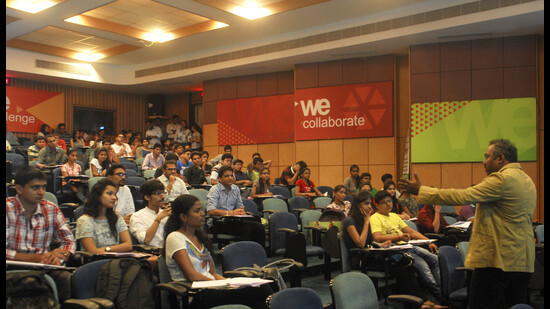MBA helps future-proof careers in the age of AI
As AI advances and reshapes industries, professionals will need broad-based business knowledge, execution chops, and leadership skills more than ever
The idea that the Master of Business Administration (MBA) degree is in decline is exaggerated. In fact, the degree remains the most sought-after graduate credential worldwide. Since 2011, the MBA has been the most popular master’s degree in the United States (US) and over 250,000 students enrol in MBA programs worldwide each year.

Top business schools are seeing a rise in applications. In 2024, applications at US business schools grew by 12%, with elite institutions seeing even bigger increases. In India, over 3.3 lakh students registered for the Common Admission Test (CAT), underscoring the degree’s enduring appeal. This enthusiasm is backed by strong employability numbers. In India, employability among business administration graduates (78%) far outpaces the overall youth employability rate (55%). Top executives are more likely to hold an MBA than any other graduate degree. Employers continue to value the MBA as a signal of leadership potential, problem solving, and business acumen.
Does the rise of Artificial Intelligence (AI) reduce the value of the MBA degree? Far from making the MBA obsolete, AI is actually elevating the degree’s value. Businesses across industries must navigate big changes as AI is poised to automate chunks of knowledge work, alter traditional business models, and reshape industries. While we are certain that the impact of AI will be significant, we do not yet know the full pace and trajectory of AI adoption. For example, a senior executive of an organisation that is a global leader in the banking sector mentioned that their organisation was testing over 600 use cases of AI with the expectation that only 100 of them might pan out for implementation. Navigating such unpredictability requires training in decision-making under uncertainty — a skill that MBAs are trained in and one that is likely to become invaluable as AI and other digital transformation technologies accelerate change.
A modern MBA also offers a well-rounded combination of soft skills, strategic thinking, AI and data-related technical skills, and functional competencies. Understanding when and what to automate, managing change, spotting opportunities for AI-enabled products and services, ensuring human oversight, and adapting to regulatory requirements and ethical norms are all important leadership skills that will be much sought after. In this way, MBAs will be the change agents who will usher in the new era of AI-driven business.
Placements at leading B-schools remain strong, with any downturns typically reflecting broader economic trends rather than a weakening of the MBA’s value. MBA salaries (a unidimensional but nevertheless a much-followed metric) continue to rise, and B-school rankings emphasise salary growth over a five-year period to highlight long-term value. Overall, graduates benefit from career growth and long-term financial returns.
Beyond corporate careers, an MBA is increasingly valuable for entrepreneurs. While entrepreneurs don’t need an MBA per se, entrepreneurs with MBAs increase their odds of success, benefiting from structured problem-solving, financial acumen, and leadership training. The future of work may see more professionals becoming free agents, or managers of “Me, Inc.” and an MBA provides the skills to navigate that scenario effectively.
According to a 2024 Graduate Management Admission Council (GMAC) survey of employers, strategic thinking, problem solving, technology skills, and AI proficiency are the most important future skills for MBAs. Employers in South Asia already rank AI competency among the top three current skills. Leading B-schools recognise the need to adapt and are embedding AI, digital transformation, and entrepreneurial thinking deeply into their curricula. A different GMAC survey in 2024 found that 42% of business schools now offer courses on AI-augmented decision-making and AI applications.
The Master of Business Administration may well be called the Master of Business Adaptability. As AI advances and reshapes industries, professionals will need broad-based business knowledge, execution chops, and leadership skills more than ever. The MBA remains the best bet for those who want to stay relevant and thrive in this new era.
Saravanan Kesavan is dean and professor of operations and Kashyap Kompella is visiting professor of AI at BITS School of Management. The views expressed are personal
All Access.
One Subscription.
Get 360° coverage—from daily headlines
to 100 year archives.



HT App & Website







